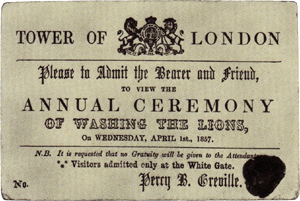 |
| A ticket to the washing of the lions, London 1857 (A prank first recorded 1698) |
Somehow, I thought of April Fools’ Day as a fairly modern American holiday. Something about the slapstick, whoopee-cushioned, rather raucous humor so often seen on this day just seemed so … New World-ish. It turns out that I was wrong on all counts, which is how this blog post came about.
April Fools’ Day has a long history. The ancient Romans celebrated “Hilaria” with masquerades and fun on March 25 in honor of the mother of the gods, Cybele, and to celebrate the end of winter (of course, it was borrowed from the Greeks). An equally ancient Hindu festival called “Holi” was celebrated in early March, also as a fun day to celebrate the defeat of evil. A similar tradition existed in Korea.
One theory of the beginning of a similar holiday in the west involves the change from the Julian calendar to the Gregorian calendar, changing the celebration of New Years from the end of March (the spring or vernal equinox) to January first. Supposedly, when the Gregorian calendar was adopted by France in 1582, some people refused to accept this change, and continued to celebrate New Years at the end of March.
This led others to make fun of them for their stubbornness, including playing pranks on them and making jokes at their expense. This became an annual event that spread throughout Europe. The calendar theory is not universally accepted.
Be that as it may, it does seem likely that April Fools’ Day is a variation or twist of traditional spring celebrations around the world. However it began, April Fools’ Day as we know it is a continuation of ancient traditions.
April Fools’ Day, also sometimes known as All Fools’ Day, has been a popular holiday in England and Scotland since the 1700’s. From there, of course, it spread to the British colonies, including America (the French also carried the tradition.) Interestingly, according to the sources I’ve checked, in Britain, one could only play jokes and pranks before noon. Once it is afternoon, April Fools is over.
There is a fascinating history of hoaxes in England associated with April Fools’ Day. The following are a couple of the most popular. People have been sent to see the “washing of the lions” at the Tower of London as long ago as 1698 (a classic example of a fruitless errand). This was especially popular in the 18th and 19th centuries, as illustrated by the ticket issued in 1857 shown above.
In 1957, a television program called “Panorama” convinced many in Britain that spaghetti grew on trees. When asked by callers how to grown their own spaghetti trees, announcers reportedly told them to put pieces of spaghetti in tomato sauce and hope for the best.
References:
Living In England. “April Fools Day.” Posted 3/31/2006. http://resources.woodlands-junior.kent.sch.uk/customs/blog/2006/03/april-fools-day.html
MetroNews.co.uk. “April Fools’ Day: Origins and History” by Sarah Deem. 3/30/2012. http://metro.co.uk/2012/03/30/april-fools-day-origins-and-history-371005
NationalGeorgraphic.com. Daily News. “April Fools’ Day Mystery: How Did It Originate?” http://news.nationalgeographic.com/news/2008/03/080328-april-fools
ProjectBritain.com. “April Fools’ Day – April 1.” http://projectbritain.com/year/aprilfools.html
The Traditions of All Fool’s Day. http://www.novareinna.com/festive/allfool.html
~~~~~~~~~~
Lauren Gilbert, author of HEYERWOOD: A Novel, lives in south Florida. Her website can be viewed by clicking HERE

I remember seeing a bit of the "spaghetti tree" hoax show. They had it on TV one time when discussing hoaxes, and had interviews with farmers worrying about the spaghetti crop. Another hoax show was centred around the notion that there was going to be a world disaster and the politicians and their friends were going to leave the Earth. There was some "secret" footage "proving" life on Mars, with the typical camera date showing as April 1. Before the show went on, viewers were urged to watch it till the end. No doubt they don't want a repeat of the War of the Worlds panic. :-)
ReplyDeleteWhat a fun post! I remember a friend telling me about the spaghetti tree hoax. It was on "This Was The Week That Was", and showed the harvest of the spaghetti trees, with people pulling strands of spaghetti into their baskets.
ReplyDeleteI was there! Heard the spaghetti hoax live - and very entertaining it was too. Actually the BBC was usually quite good at April Fool's day stuff. We used to be agog to hear / see what was said on the news on April 1st - trouble was they were sometimes so well done that they took us all in!
ReplyDeleteThe spaghetti crop: yes we can laugh now, but it shows how "new" spaghetti was in the British diet of 1957.
ReplyDeleteGreat post. I love the ticket to view the "Washing of the Lions".
Sorry, forgot... in the UK jokes/pranks are until noon, true, but post-noon is known as "legging up" (think prat-falls such as slipping on a banana skin) except they are not self-induced. I can still recall the grazed knees from my childhood!
ReplyDeleteFun post! Shared.
ReplyDelete